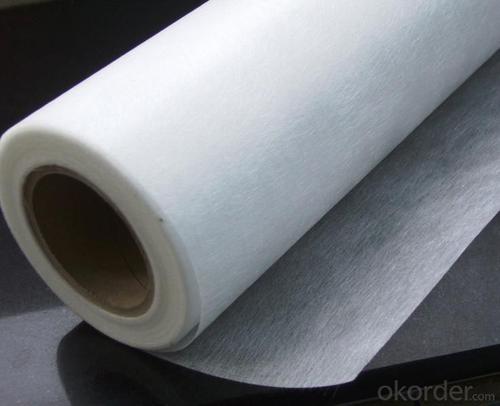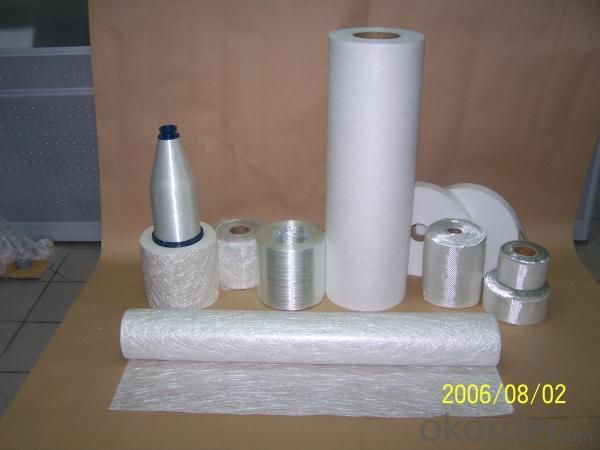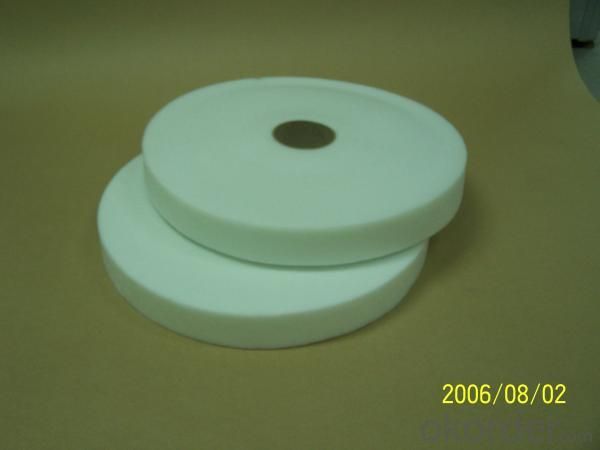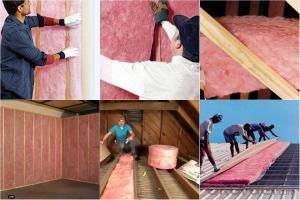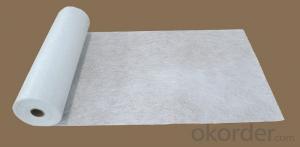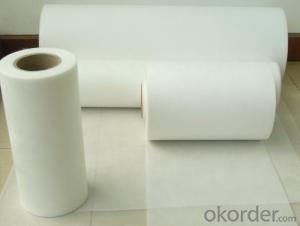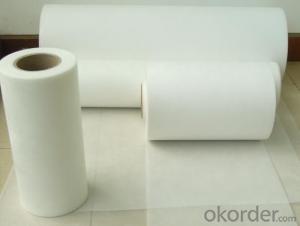C-Glass Fiberglass Mat Tissue
- Loading Port:
- China Main Port
- Payment Terms:
- TT or LC
- Min Order Qty:
- 2000Square Meter m²
- Supply Capability:
- 600000 Square Meter Per Month m²/month
OKorder Service Pledge
OKorder Financial Service
You Might Also Like
Packaging & Delivery of C-Glass Surface Tissue
Packaging Detail: | standard width: 1000mm/1040mm/1270mm, standard length: 300m usually packed in pp bag and then in cartons. Loading quantity is around 75000m2/20ft container or 189000m2/40" container. |
Delivery Detail: | 15 days after receipt of down payment |
Specifications of C-Glass Surface Tissue
1. fiberglass surfacing tissue
2.corrosion resistance
3. low binder content
4. good molding properties
5. Lloyd's approved
Introduction of C-Glass Surface Tissue
Fiberglass surface tissue is mainly used in the surface layers of FRP products. There are two types, winding series and hand lay-up series.
Winding series are mainly used on pipe and tank winding process. It can improve the product surface property on corrosion resistance, comprehensive strength, seepage resistance and longer service life.
Hand lay-up series are chiefly used in the products with complicated geometric curve. It has the advantages of good pattern fitness, quick resin permetion. It can raise the intensity and corrosion resistance of products
Characteristics of C-Glass Surface Tissue
Surface felt used in the fiberglass products, good permeability make resin instantly penetrate into, and eliminate the bubble and white stains phenomenon, it good effect for any sexual complex shape of products and mold surface, can cover up the cloth grain, improve surface finish and the permeability, and at the same time enhance interlaminar shear strength and surface toughness, make the products improve corrosion resistance, is manufacture high quality glass fiber reinforced plastic mold and the products of the essential supplies.
Application | Density (g/m2) | Moisture Content (%) | Binder Content (%) | Wetting time (%) | Tensile Strength MD(N/5CM) |
Winding | 20 | <0.2 | 7 | <8 | ≥20 |
30 | 6 | <10 | ≥25 | ||
50 | 6 | <16 | ≥40 | ||
Hand Lay UP | 30 | 7 | <10 | ≥20 | |
40 | 6 | <15 | ≥25 | ||
50 |
Product features of C-Glass Surface Tissue
The glass mat for FRP surface has a fiber dispersion, smooth surface, soft hand-feeling, low binder content , fast resin impregnation and good mould obedience which make it most applicable to other FRP molding processes such as press moulding , spray-up, centrufugal rotating moulding.
1 C-glass tissue used in machine or continuous operation paste hand made of fiberglass products (FRP), the plate, the pipeline, groove, cans, yacht, tub products.
2 E-glass fiberglass felt used for thin epoxy after COINS and electrical insulation products.
3 Alkali glass fiber thin felt used in battery of isolation, waterproofing roof, plasterboard is the panel, plastic floor and chemical pipe lined with leakage, corrosion quality materials.
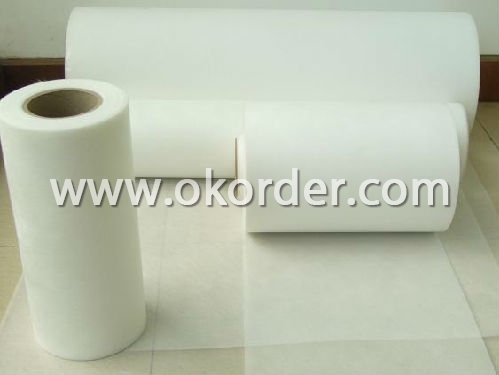
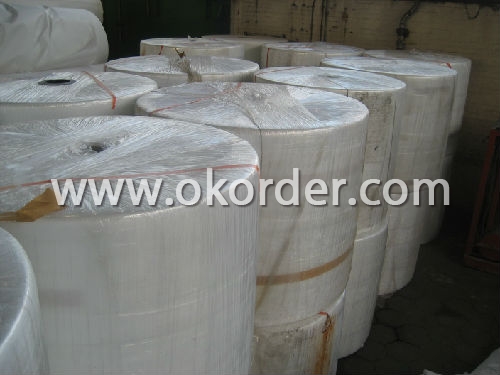
- Q: What are the common sizes available for fiberglass mat tissue?
- The common sizes available for fiberglass mat tissue can vary depending on the specific application or manufacturer. However, some common sizes include widths of 1 meter (39 inches), 1.27 meters (50 inches), and 1.52 meters (60 inches). The length of the fiberglass mat tissue can also vary, with common options ranging from 50 meters (164 feet) to 300 meters (984 feet) or more. It's important to note that these dimensions are just examples and may not reflect all available sizes on the market.
- Q: How is fiberglass mat tissue used in the construction industry?
- Various applications in the construction industry make fiberglass mat tissue widely used. This material consists of thin strands of glass fibers bonded together with a resin, providing properties suitable for construction purposes. Roofing materials often utilize fiberglass mat tissue as a reinforcement layer in shingles or sheets. It enhances the roof's strength and durability, making it more resistant to weather elements like wind, rain, and hail. It also prevents cracking and splitting, extending the lifespan of the roofing material. Fiberglass mat tissue has another application in the construction industry, specifically in the production of composite materials. It serves as a reinforcement layer in composite panels and boards, enhancing their strength and stiffness. Its lightweight nature makes it ideal for building materials that require both strength and reduced weight. In the construction of walls and ceilings, fiberglass mat tissue can be applied between the gypsum board and insulation material. This provides additional strength and impact resistance, preventing cracks and damage to the building's structure. Additionally, fiberglass mat tissue finds use in the manufacturing of pipes and tanks. It reinforces fiberglass-reinforced plastic (FRP) pipes and tanks, adding strength and rigidity. This makes it suitable for various industrial applications, including chemical processing, wastewater treatment, and the oil and gas industries. In summary, fiberglass mat tissue is widely used in the construction industry due to its strength, durability, and lightweight properties. It is applied in roofing materials, composite panels, walls, ceilings, pipes, and tanks, among other applications. Construction professionals prefer it for its versatility and ability to enhance the structural integrity of various building components.
- Q: Is fiberglass mat tissue suitable for insulation in chemical processing plants?
- Yes, fiberglass mat tissue is suitable for insulation in chemical processing plants. It is highly resistant to corrosion and chemicals, making it an ideal choice for such environments. Additionally, fiberglass mat tissue offers excellent thermal insulation properties, helping to maintain optimal temperature levels in the plant.
- Q: Is fiberglass mat tissue resistant to solvents?
- Yes, fiberglass mat tissue is generally resistant to solvents.
- Q: What are the potential environmental impacts of using fiberglass mat tissue?
- The potential environmental impacts of using fiberglass mat tissue include the release of harmful airborne particles during production and installation, which can contribute to air pollution and respiratory issues. Additionally, the disposal of fiberglass mat tissue can pose challenges as it is not biodegradable and may contribute to landfill waste.
- Q: Does fiberglass mat tissue require any special handling or storage requirements?
- Yes, fiberglass mat tissue does require special handling and storage requirements. It should be stored in a dry, clean, and well-ventilated area to prevent moisture absorption. It should also be kept away from direct sunlight and extreme temperatures to maintain its quality. Additionally, it is important to handle fiberglass mat tissue with care to avoid any damage or injury, as it can be sharp and fragile.
- Q: Does fiberglass mat tissue provide any acoustic insulation?
- Yes, fiberglass mat tissue provides acoustic insulation as it effectively absorbs and dampens sound waves, reducing noise transmission and improving soundproofing properties.
- Q: Can fiberglass mat tissue be used for making decorative panels?
- Fiberglass mat tissue is a versatile material commonly used in construction and manufacturing industries. It consists of randomly oriented glass fibers bonded together with a binder, resulting in a strong and durable product suitable for various applications. For decorative panels, fiberglass mat tissue is an excellent option. It can be molded into different shapes and sizes, allowing for intricate and unique designs. The material is lightweight and easy to handle and install. Additionally, it has excellent dimensional stability, ensuring it won't warp or deform over time. Moreover, fiberglass mat tissue is highly resistant to moisture, chemicals, and UV radiation, making it suitable for both indoor and outdoor use. It can withstand harsh weather conditions without rotting or decaying. This durability ensures that decorative panels made from fiberglass mat tissue will maintain their appearance and functionality for an extended period. When it comes to finishing, fiberglass mat tissue can be easily painted or coated to achieve the desired aesthetic. It can also be laminated with other materials, such as wood veneer or decorative films, to enhance its visual appeal. This flexibility offers endless design possibilities, making fiberglass mat tissue an excellent choice for creating decorative panels. In conclusion, fiberglass mat tissue is a reliable material for making decorative panels. Its strength, durability, and versatility make it suitable for various indoor and outdoor applications. Whether you want to create unique designs or enhance the aesthetics of a space, fiberglass mat tissue provides the necessary qualities to achieve your desired outcome.
- Q: What are the key properties of fiberglass mat tissue?
- Fiberglass mat tissue is a versatile material that possesses several key properties. Firstly, it is made from fine glass fibers that are randomly oriented and bonded together with a binder. This random orientation allows for greater strength and flexibility compared to other materials. One key property of fiberglass mat tissue is its high tensile strength. It can withstand significant amounts of pulling or stretching forces without breaking, making it ideal for applications that require durability and resistance to mechanical stress. Another important property is its excellent thermal insulation capabilities. Fiberglass mat tissue has a low thermal conductivity, meaning it can effectively prevent the transfer of heat. This property makes it suitable for use in insulation applications where it helps to conserve energy and maintain a stable temperature. Fiberglass mat tissue also exhibits good chemical resistance. It is not easily affected by exposure to chemicals, acids, or alkaline substances. This property makes it a suitable choice for applications such as chemical storage tanks or pipes where resistance to corrosion is required. Furthermore, fiberglass mat tissue has excellent moisture resistance. It does not absorb water easily, which makes it resistant to rot and decay. This property makes it suitable for outdoor applications or in environments with high humidity. Lastly, fiberglass mat tissue is lightweight and easy to handle. It can be easily cut, shaped, and installed, making it a convenient material for various applications. In summary, the key properties of fiberglass mat tissue include high tensile strength, thermal insulation capabilities, chemical resistance, moisture resistance, and lightweight. These properties make it a versatile material that can be used in a wide range of applications such as construction, automotive, aerospace, and marine industries.
- Q: Can fiberglass mat tissue be used for interior decoration?
- Yes, fiberglass mat tissue can be used for interior decoration. It is commonly used as a reinforcement material in wall coverings, ceiling tiles, and other decorative elements. Its durability, fire resistance, and versatility make it suitable for various interior design applications.
1. Manufacturer Overview
| Location | Hebei,China |
| Year Established | 2008 |
| Annual Output Value | Above US$20 Million |
| Main Markets | Mid East;Western Europe:South Asian |
| Company Certifications | ISO9001:2000;ISO14001:1996;GB/T28001:2001 |
2. Manufacturer Certificates
| a) Certification Name | |
| Range | |
| Reference | |
| Validity Period |
3. Manufacturer Capability
| a) Trade Capacity | |
| Nearest Port | Tianjin |
| Export Percentage | 80% |
| No.of Employees in Trade Department | 350 People |
| Language Spoken: | English;Chinese;Korean |
| b) Factory Information | |
| Factory Size: | Above 100,000 square meters |
| No. of Production Lines | Above 12 |
| Contract Manufacturing | OEM Service Offered;Design Service Offered |
| Product Price Range | Average |
Send your message to us
C-Glass Fiberglass Mat Tissue
- Loading Port:
- China Main Port
- Payment Terms:
- TT or LC
- Min Order Qty:
- 2000Square Meter m²
- Supply Capability:
- 600000 Square Meter Per Month m²/month
OKorder Service Pledge
OKorder Financial Service
Similar products
Hot products
Hot Searches
Related keywords



